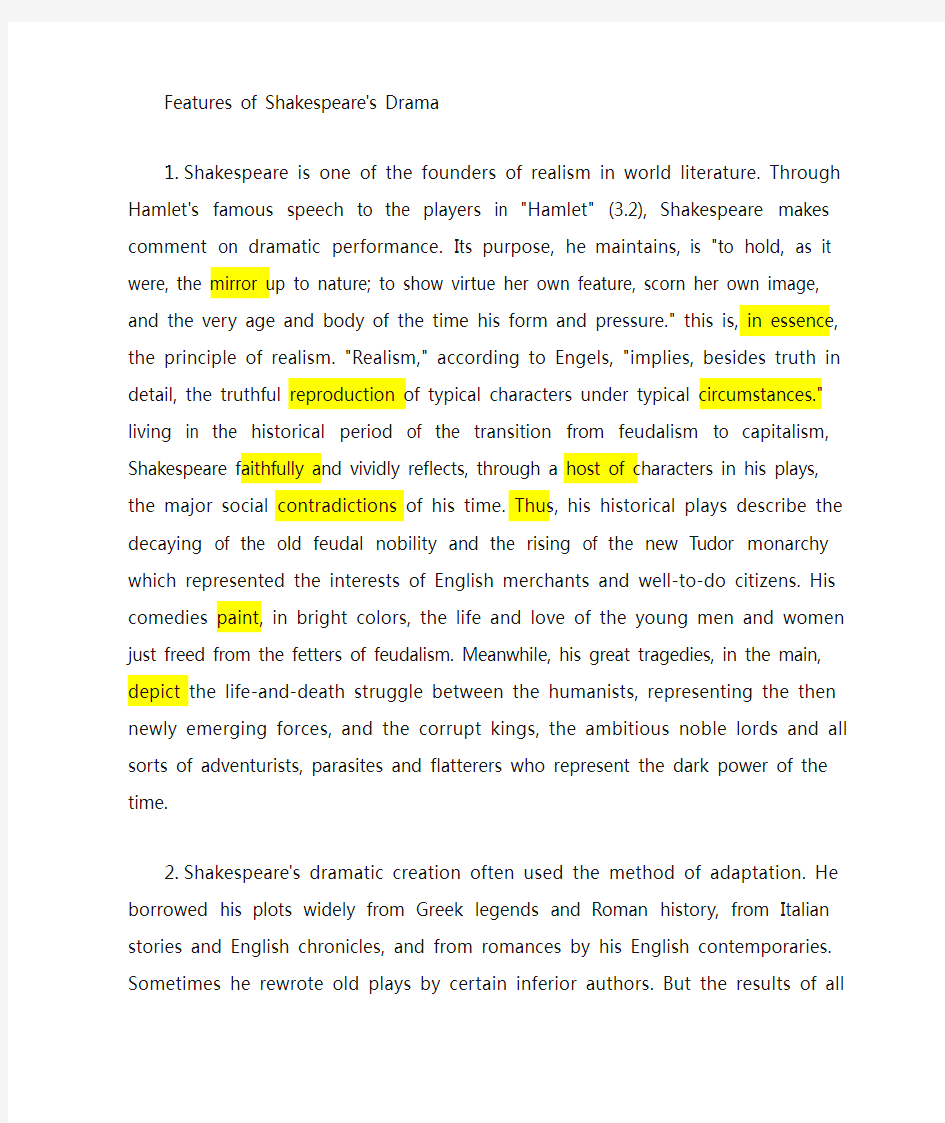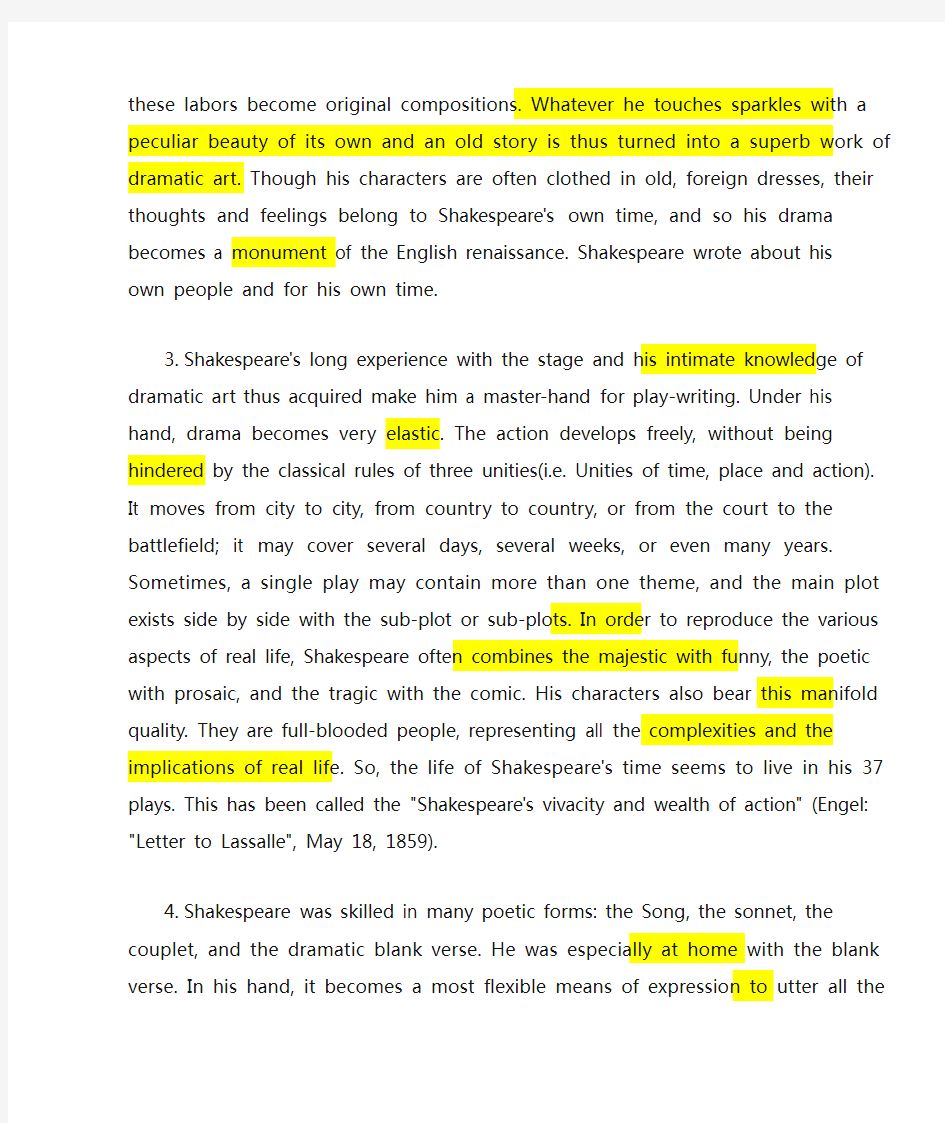莎士比亚戏剧特点


Features of Shakespeare's Drama
1.Shakespeare is one of the founders of realism in world literature. Through Hamlet's famous speech to the players in "Hamlet" (3.2), Shakespeare makes comment on dramatic performance. Its purpose, he maintains, is "to hold, as it were, the mirror up to nature; to show virtue her own feature, scorn her own image, and the very age and body of the time his form and pressure." this is, in essence, the principle of realism. "Realism," according to Engels, "implies, besides truth in detail, the truthful reproduction of typical characters under typical circumstances." living in the historical period of the transition from feudalism to capitalism, Shakespeare faithfully and vividly reflects, through a host of characters in his plays, the major social contradictions of his time. Thus, his
historical plays describe the decaying of the old feudal nobility and the rising of the new Tudor monarchy which represented the interests of English merchants and well-to-do citizens. His comedies paint, in bright colors, the life and love of the young men and women just freed from the fetters of feudalism. Meanwhile, his great tragedies, in the main, depict the life-and-death struggle between the humanists, representing the then newly emerging forces, and the corrupt kings, the ambitious noble lords and all sorts of adventurists, parasites and flatterers who represent the dark power of the time.
2.Shakespeare's dramatic creation often used the method of adaptation. He borrowed his plots widely from Greek legends and Roman history, from Italian stories and English chronicles, and from romances by his
English contemporaries. Sometimes he rewrote old plays by certain inferior authors. But the results of all these labors become original compositions. Whatever he touches sparkles with a peculiar beauty of its own and an old story is thus turned into a superb work of dramatic art. Though his characters are often clothed in old, foreign dresses, their thoughts and feelings belong to Shakespeare's own time, and so his drama becomes a monument of the English renaissance. Shakespeare wrote about his own people and for his own time.
3.Shakespeare's long experience with the stage and his intimate knowledge of dramatic art thus acquired make him a master-hand for play-writing. Under his hand, drama becomes very elastic. The action develops freely, without being hindered by the classical rules of three
unities(i.e. Unities of time, place and action). It moves from city to city, from country to country, or from the court to the battlefield; it may cover several days, several weeks, or even many years. Sometimes, a single play may contain more than one theme, and the main plot exists side by side with the sub-plot or sub-plots. In order to reproduce the various aspects of real life, Shakespeare often combines the majestic with funny, the poetic with prosaic, and the tragic with the comic. His characters also bear this manifold quality. They are full-blooded people, representing all the complexities and the implications of real life. So, the life of Shakespeare's time seems to live in his 37 plays. This has been called the "Shakespeare's vivacity and wealth of action" (Engel: "Letter to Lassalle", May 18, 1859).
4.Shakespeare was skilled in many poetic forms: the Song, the sonnet, the couplet, and the dramatic blank verse. He was especially at home with the blank verse. In his hand, it becomes a most flexible means of expression to utter all the possible thoughts and feelings of his characters, "from merely colloquial dialogue to strains of impassioned soliloquy, from repartee to tragic eloquence, from terse epigrams to elaborate description"
5.Shakespeare was a great master of the English language. He commanded a vocabulary larger than any other English writer. He used about 16,000 words. Many of his new coinages and turns of expression have become everyday usage in English life. Shakespeare and the Authorized Version of the English Bible are the two great treasuries of the English
language.
Shakespeare has been universally acknowledged to be the summit of English Renaissance, and one of the greatest writhers the world over.
Paul Lafague tells how much Marx was fond of Shakespeare:"He had made an exhaustive study of Shakespeare, for whom he had an unbounded admiration, and whose most insignificant characters, even, were familiar to him. There was a veritable Shakespeare cult in the Marx family, and the three daughters knew much of Shakespeare by heart."
The popularity of Shakespeare is a worldwide phenomenon. His name has been known to China for more than a hundred years, and many of his plays have been widely read among Chinese people.
